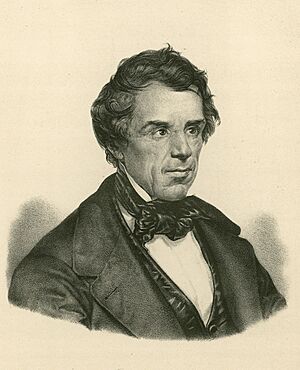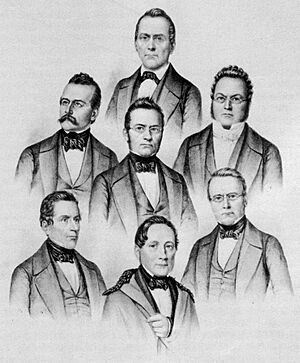Stefano Franscini facts for kids
Quick facts for kids
Stefano Franscini
|
|
|---|---|

Stefano Franscini
|
|
| Member of the Swiss Federal Council | |
| In office 1848–1857 Serving with Six others
|
|
| Preceded by | None |
| Succeeded by | Giovanni Battista Pioda |
Stefano Franscini (born October 23, 1796 – died July 19, 1857) was an important Swiss politician and expert in statistics. He was one of the very first people chosen to be part of the Swiss Federal Council in 1848. This made him Switzerland's first federal councilor who spoke Italian as his native language. Franscini was connected to the Liberal Radical Party. During his time in office, he was in charge of the Department of Home Affairs. He is remembered for his work in reforming politics in the Ticino area in the 1830s and 1840s. He also organized Switzerland's first country-wide population count in 1850. Plus, he helped create the famous Swiss Federal Institute of Technology in 1854/1855.
Early Life and Education
Stefano Franscini was born in a small village called Bodio. His family were farmers and did not have much money. Until he was eleven, he went to a winter school run by a priest in a nearby village. From 1808 to 1814, he studied at a seminary for priests in Pollegio. After that, he continued his education at another seminary in Milan.
In 1819, he decided not to become a priest. Instead, he chose to study history, law, economics, and teaching methods. He paid for his studies by working as a teacher and writing school books. He became friends with Carlo Cattaneo, who was part of a group called the Carboneria. Cattaneo introduced Franscini to new political ideas in Milan. He also learned about the work of economist Melchiorre Gioia, which made Franscini very interested in statistics about money and society. In 1823, he married Teresa Massari. They had two children before she passed away in 1831.
Political Career
Franscini returned to Bodio in 1824. He kept working as a teacher and writer. He also wrote articles about history, economics, and statistics for a newspaper called Gazzetta Ticinese. He and his wife started a girls' school in Lugano. This school used a teaching method called the Bell-Lancaster method, which was popular but also caused some debate.
In 1827, Franscini published a book called Statistica della Svizzera ("Statistics of Switzerland"). This was the first time anyone had ever done a detailed comparison of statistics for all of Switzerland. The book shared ideas about freedom and progress, and it was also translated into German. This book helped Franscini become well-known in politics. A year later, he wrote Della pubblica istruzione nel Cantone Ticino ("On public education in the canton of Ticino"). In this book, he strongly criticized how old-fashioned the local government's education policies were.
Another important political book he wrote was published in Zürich in 1829. It was called Della riforma della Costituzione ticinese ("On the reform of the Ticino's constitution"). This book called for big changes and explained how a government based on freedom should be set up. It also criticized the old, strict ways of the canton's government. Franscini continued to write for newspapers that supported new ideas. Between 1837 and 1840, he published La Svizzera italiana. This was a plan for changes in the Ticino canton, based on a lot of statistical information about its politics and economy.
The government of the Ticino canton, led by Landamano Giovanni Battista Quadri, did not like his writings. However, many people in the Ticino's law-making body agreed with Franscini's ideas. His work helped bring about changes to the constitution and a new government. In the years that followed, Franscini held several important jobs in the canton. He worked as a state secretary from 1830 to 1837 and again from 1845 to 1847. In this role, he helped prepare decisions and laws for the canton's government. He was also an elected member of this government from 1837 to 1845, and again from 1847 to 1848.
Franscini also represented the Ticino canton at the Tagsatzung (a meeting of representatives from all Swiss cantons) in 1841, 1843, 1845, and 1846. During his time in these roles, Franscini was often sent on special missions. For example, he helped calm people and provide aid in the Mendrisiotto area during a cholera outbreak in 1836. He did this again during a time of great hunger in 1847. That same year, he helped organize armed defense in the Ticino. This was to deal with the retreating troops of the Sonderbund, who were losing a war. At a national level, he attended meetings about trade, taxes, and postal services between the cantons. In 1847, he was asked to help bring about a peaceful change to a more open government in the Valais canton after they lost the Sonderbund War. The Tagsatzung also sent him to Naples. There, Swiss mercenaries (soldiers for hire) were accused of bad behavior while stopping uprisings before the revolutions of 1848.
Federal Council and Legacy
Stefano Franscini was the fifth person suggested during the first election for the Swiss Federal Council. This election was held by the new Federal Assembly on November 16, 1848. He was elected in the third round of voting. He received 68 out of 135 votes, which was just enough to win. He had the fewest votes among the first seven members of the Federal Council.
For all eight years he was in office, Franscini was in charge of the Federal Department of Home Affairs. In 1848, the Swiss constitution gave the cantons (states) much more freedom than they would have later. Because of this, the department's job was quite small compared to what it would become. Its main tasks were to set up the federal office and federal records. Other duties included collecting statistics, making sure religious rights were respected, and keeping peace between different religious groups. The department also handled health measures during epidemics and worked on making weights and measurements the same across the country.
One of the most important things the department achieved under Franscini was creating a federal polytechnical institute. Franscini originally wanted to build a national university that would help unite the country. However, because different cantons had their own ideas and rivalries, he had to change his plan. Instead, they created a school focused on technology. The Eidgenössische Polytechnische Schule (Swiss Federal Institute of Technology) in Zürich started its first classes in the autumn of 1855.
Franscini was able to use his interest in statistics in his work in 1850. At that time, the number of seats each canton would get in the National Council needed to be figured out. Franscini was asked to organize Switzerland's first country-wide population count. He strongly believed that collecting and studying statistical information was very important for a country to make progress. However, he could not convince other politicians of its importance. The Parliament did not give him enough money to analyze the census data. So, with the help of a private assistant, he had to analyze all the information himself. His findings were published in five books between 1851 and 1858. These books were called Beiträge zur Statistik der schweizerischen Eidgenossenschaft ("Contributions to the Statistics of the Swiss Confederation"). The Federal Statistical Office was not created until 1860, after Franscini had passed away. At that time, a law was also passed saying that a federal population count should happen every ten years.
Even though the Federal Council was always chosen by the Federal Assembly, there was an unwritten rule back then. This rule, which was later dropped, said that federal councilors should also be re-elected in their home canton's election for the National Council. Franscini passed this test in 1851. But three years later, during the national elections of 1854, he failed. This was because of disagreements among the different groups of liberals in the Ticino canton. He had to run in a special election held later in the canton of Schaffhausen. There, he finally got enough votes. The official election for the Federal Council by the Federal Assembly in 1854 was also difficult for him. Franscini did not get enough votes until the third round. Many members of the assembly had voted for his friend from Ticino, Giovanni Battista Pioda.
Franscini was tired because his hard work was not always appreciated. He was also worried about having another difficult election. So, he decided to leave his job in 1857. He planned to work in the Ticino's canton archives. However, he passed away unexpectedly in Bern on July 19, 1857, at the age of 60. He was still in office when he died. Eleven days later, Giovanni Battista Pioda was chosen to take his place.
 | Aaron Henry |
 | T. R. M. Howard |
 | Jesse Jackson |


